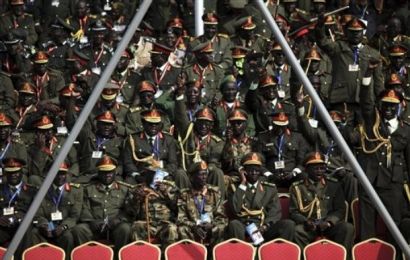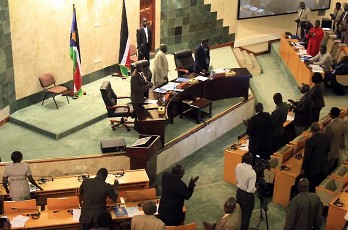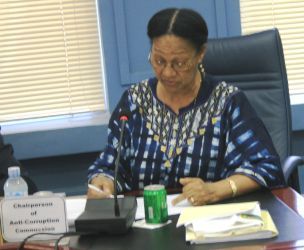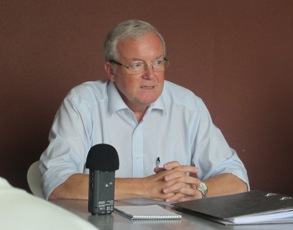SPLA top generals asked by anti-corruption to declare their assets
February 27, 2012 (JUBA) – Top generals of the South Sudan army, the Sudan People’s Liberation Army (SPLA), have been asked by the South Sudan Anti-Corruption Commission (SSACC) to declare their income and assets, in the latest effort to tackle corruption.

On Sunday the chairperson of the SSACC Judge John Gatwech Lul, met with the Chief of General Staff, James Hoth Mai, and his five deputies at the army’s general headquarters in Bilpam. Gatwech presented income and assets declaration forms to the army leadership and asked them to cooperate.
The Chief of General Staff, James Hoth Mai, assured the anti-corruption chairperson of their full cooperation to declare their assets. He said there is no reason for people to “panic” because it is the right way to stamp out corruption.
The result of the auditing of government accounts from 2005 to 2006, released by the Auditor General and presented to the parliament recently, revealed that over $1 billion US dollars ‘disappeared’ in that period alone and could not be accounted for.
The revelation prompted the South Sudan parliament to summon both the former Minister of Finance and Economic Planning, Arthur Akwen Chol and the Governor of the then Central Bank of Southern Sudan (CBoSS), Elijah Malok Aleng, accusing them of facilitating corruption.
However, only Elijah Malok appeared in the parliament and denied the accusations directed to him. Malok said some of the missing money was diverted to the personal bank of the former finance minister, Arthur Akwen, who asked the bank to transfer such amount from to his personal bank account.
Two weeks ago Akwen organised a press conference in Juba in which he denied all the accusations against him. One of the accusations against Akwen is that when he purchased vehicles for the government in 2006 from Cardinal Company the transaction was recorded at doubled the price of what they were worth, leaving millions of dollars unaccounted for.
He said he was “directed” by the Vice President, Riek Machar, to purchase the vehicles from the company.
Machar acknowledges that he “referred” to the minister the urgent need to purchase vehicles for the government institutions as the institutions were being established, but did not “direct” him on the technicalities involved. He said the technical details such as how much each vehicle should cost was determined by the ministry of finance and economic planning.
Machar, declared his income and assets to the corruption commission two weeks ago and urged others to follow suit. However, the details of his wealth and assets have not been made public.
Akwen also accused the SPLM Secretary General, Pagan Amum, of embezzling $30 million and diverting the amount to his personal account, explaining that the order to release the money came from “above”. He did not specify who this was referring to.
Pagan Amum denies the accusations and has threatened to take Akwen to court over the matter. Akwen maintained that he has the documents to support his allegations.
LIST OF 13 CORRUPT MINISTERS
He also revealed that there are 13 more corrupt senior officials in the government and dared the speaker of parliament, James Wani Igga, to have courage to release the list of the names to the public.

However, despite their reservations MPs from the ruling SPLM, caved in under pressure from their party and approved the new cabinet despite suspecting that corrupt ministers may be among them.
The list of corrupt officials was handed to South Sudanese authorities by the US. It is believed to include officials with excessively large accounts in foreign banks.
Many ministers from the previous government remain in the current cabinet.
NO GRAFT CONVICTIONS IN 7 YEARS
In over five years the SSACC has failed to refer an single prosecution for investigation and no official has been prosecuted by the courts. South Sudan gained self-rule in 2005 as part of a wealth and power sharing deal with the north.
Hundreds of corruption related cases have been waiting for years in South Sudan without proper investigation. The asset declaration forms are the South Sudan government’s latest attempt to stem corruption, which is rife in seven month old country. A previous attempt at the scheme failed as most forms were not returned.

2007-2011 AUDIT REPORT
There are fears in the public that once the Auditor General releases his report for 2007 to 2011 more billions of dollars may be reported unaccounted for. The scale of corruption and mismanagement in his report for 2005 and 2006 brought some MPs in South Sudan’s National Legislative Assembly to tears.
The coming report for cover the period of the infamous “Dura saga” under another former minister of finance, Kuol Athian, which officials described as the most costly corruption scandal since the formation of government in 2005. Billions of dollars supposed to build and repair grain stores as well as buy grain to prepare for food shortages has gone missing.
POWER TO PROSECUTE?
South Sudan’s President Salva Kiir Mayardit has announced that the SSACC also takes the responsibility of prosecuting culprits after they investigate cases and find them guilty. The prosecution power used to be under the jurisdiction of the Ministry of Justice.
However, the chairperson of SSACC Gatwech, said that until the president’s statement is translated into law the commission will not be able to prosecute. He urged the ministry of Justice to expedite the bill and present it to parliament in order to enact a law which will give legal powers to the anti-corruption body to prosecute culprits.
Kiir first promised to give the SSACC power to prosecute in 2009, when he announced the the anti-corruption commission was to be upgraded to the status above that of a ministry. However, two and half years later the SSACC still does not have the legal power to prosecute the officials it investigates.
However, the appointment of Gatwech, a judge, may signal that this is about to change. The power to prosecute continues to be in the hands of the Ministry of Legal Affairs and Constitutional Development.
In September 2011 the SSACC released a report stating that it was investigating some 60 cases of corruption and was trying to recover more than SSP 120 million (approx. $20 million). The report to the surprise of many, including Paul Akol MP, made no reference to the list of 13 top officials.
Salva Kiir has given a deadline to all constitutional post holders and senior civil servants throughout South Sudan to declare their income and assets, or else submit their resignations.
Judge Gatwech earlier on said his institution has been establishing cooperation with governments abroad so that they reveal the bank accounts of South Sudanese officials in their various financial institutions.
There are suspicions, he said, that some officials might have banked their money abroad under different names, making it difficult to trace.
He also added that they are mobilising expertise from Europe and America to assist the commission in using the latest techniques of tracing and detecting “stolen” money from bank accounts around the world.
DONOR PRESSURE
In an interview with the BBC this month the head of the UN Mission in South Sudan, Hilde F. Johnson said that Juba had to do more to tackle corruption.

“Our mandate as joint donors is to provide technical and financial support to the southern government. However, we strongly feel that development aid allocated for specific purposes should not be wasted in corruption related practices,” Michael Elmquist, head of the JDT said.
A delegation from the European Union in July 2011, told Juba that the fight against corruption in South Sudan will only be meaningful if the country’s parliamentarians adopt a tough and comprehensive approach towards ending it.
In 2010 the corruption perception index of Transparency International ranked Sudan as the seventh most corrupt country in the world. The international anti-corruption group has yet to rank South Sudan’s position since it only seceded from Sudan less than a year ago.
Ever since the Government of South Sudan was formed as part of the 2005 Comprehensive Peace Agreement it has been blighted by accusations of corruption. Since a referendum in January granted South Sudan independence, donors, the media and the public have begun to take a harder line on corruption.
(ST)
